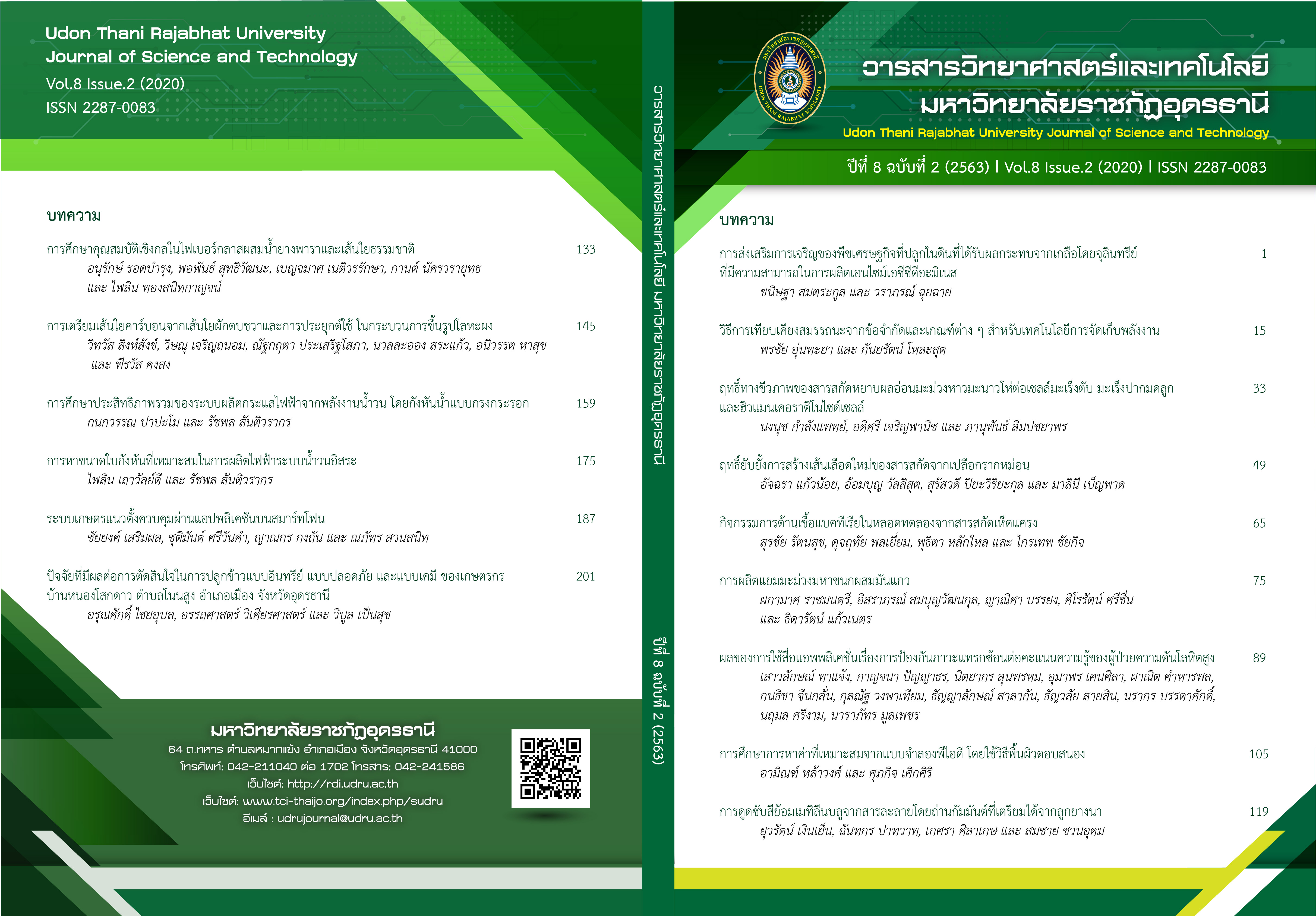การส่งเสริมการเจริญของพืชเศรษฐกิจที่ปลูกในดินที่ได้รับผลกระทบจากเกลือโดยจุลินทรีย์ที่มีความสามารถในการผลิตเอนไซม์เอซีซีดีอะมิเนส
Main Article Content
บทคัดย่อ
ปัญหาดินเค็มเป็นปัญหาดินที่สำคัญในประเทศไทย ซึ่งทำให้การเจริญเติบโตของพืชลดลง โดยส่งผลกระทบต่อการทำงานของพืชหลายประการ เช่น ยับยั้งการสังเคราะห์ด้วยแสง กระตุ้นให้เกิดอนุมูลอิสระ และทำให้พืชสร้างเอทิลีนมากขึ้น การใช้แบคทีเรียส่งเสริมการเจริญเติบโตของพืชที่มีความสามารถในการผลิตเอนไซม์เอซีซีดีอะมิเนส เป็นวิธีการหนึ่งที่ช่วยส่งเสริมการเจริญเติบโตของพืชในสภาวะดินเค็มได้ เพราะเอนไซม์เอซีซีดีอะมิเนสจะลดปริมาณเอซีซี ซึ่งเป็นสารตั้งต้นในการสังเคราะห์เอทิลีนในพืช ในบทความนี้ จึงได้รวบรวมข้อมูลเกี่ยวกับผลกระทบของสภาวะดินเค็มต่อการเจริญเติบโตของพืช บทบาทของเอทิลีนในการตอบสนองต่อสภาวะเครียดเกลือในพืช การทำงานของเอนไซม์เอซีซีดีอะมิเนส และบทบาทของแบคทีเรียที่มีความสามารถในการผลิตเอนไซม์เอซีซีดีอะมิเนสต่อการส่งเสริมการเจริญเติบโตของพืช เพื่อเป็นข้อมูลพื้นฐานสำหรับการนำแบคทีเรียกลุ่มนี้ไปใช้ประโยชน์ทางการเกษตรต่อไป
Article Details
เอกสารอ้างอิง
Afridi, M. S., Sumaira, A., Mahmood, T., Salam, A., Mukhtar, T., Mehmood, S., Ali, J., Khatoon, Z., Bibi, M., Javed, M. T., Sultan, T. & Chaudhary, H. J. (2018). Induction of tolerance to salinity in wheat genotypes by plant growth promoting endophytes: Involvement of ACC deaminase and antioxidant enzymes. Plant Physiology and Biochemistry, 139, 569-577.
Arunin, S., & Pongwichian, P. (2016). Salts-affected soil and management in Thailand. Bulletin of the Society of Sea Water Science, Japan, 69, 319-325,
Arunin, S., (1996). Salted soil in Thailand, Retrieved January 17, 2020 from http://www.ldd.go.th/Lddwebsite/web_ord/Technical/pdf/P_Technical03035_1.pdf.
Bharti, N., & Barnawal, D. (2019). Chapter Five - amelioration of salinity stress by PGPR: ACC deaminase and ROS scavenging enzymes activity. In A. K. Singh, A. Kumar, & P. K. singh (Eds), PGPR Amelioration in Sustainable Agriculture (pp. 85-106), Elsevier. Doi.org/10.1016/B978-0-12-815879-1.00005-7.
Bhise, K. K., & Dandge, P. B. (2019). Mitigation of salinity stress in plants using plant growth promoting bacteria. Symbiosis, 79, 191-204.
Gupta, B., & Huang, B. (2014). Mechanism of salinity tolerance in plants: physiologicals, biochemical and molecular characterization. International Journal of Genomics, Doi: 10.1155/2014/701596.
Gupta, S., & Pandey, S. (2019). Unravelling the biochemistry and genetics of ACC deaminase-An enzyme alleviating the biotic and abiotic stress in plants. Plant Gene, Doi.org/10.10.16/j.plgene.2019.100175.
IIangumaran, G., & Smith, D.L. (2017). Plant growth promoting rhizobacteria in amelioration of salinity stress: A systems biology perspective. Frontiers in Plant Science, Doi.org/10.3389/fpls.2017.01768.
Isayenkov, S. V., & Maathuis, F. J. M. (2019). Plant salinity stress: many unanswered questions remain. Frontiers in Plant Science, Doi: 10.3389/fpls.2019.00080.
Lacey, R. F., & Binder, B. M. 2014. How plants sense ethylene gas–The ethylene receptors. Journal of Inorganic Biochemistry. 133, 58-62.
Machado, R. M. A., & Serralheiro, R. P. (2017). Soil salinity: effect on vegetable crop growth. Management practices to prevent and mitigate soil salinization. Horticulturae, Doi:10.3390/horticulturae3020030.
Numan, M., Bashir, S., Khan, Y., Mumtaz, R., Shinwari, Z. K., Khan, A. L., Khan, A., & Al-Harrasi, A. (2018). Plant growth promoting bacteria as an alternative strategy for salt tolerance in plants: A review. Microbiological Research, 209, 21-32.
Orozco-Mosqueda, M., Duan, J., DiBernardo, M., Zetter, E., Campos-Garcia, J., Glick, B.R., & Santoyo, G. (2019). The production of ACC deaminase and trehalose by the plant growth promoting bacterium Pseudomonas sp. UW4 synergistically protect tomato plants against salt stress. Frontiers in Microbiology, Doi.org/10.3389/fmicb.2019.01392.
Rasool, S., Hameed, A., Azzoz, M. M., Rehman, M., Siddiqi, T. O., & Ahmad, P. (2013). Salt stress: causes, types and responses of plants. In P. Ahmads (Ed), Ecophysiology and Responses of Plants under Salt Stress (pp.1-24). New York: Springer.
Samaddar, S., Chatterjee, P., Choudhury, A. R., Ahmed, S. & Sa, T. (2019). Interactions between Pseudomonas spp. and their role in improving the red pepper plant growth under salinity stress. Microbiological Research, 219, 66-73.
Sarkar, A., Ghosh, P. K., Pramanik, K., Mitra, S., Soren, T., Pandey, S., Mondal, M. H., & Maiti, T. K. (2018a). A halotolerant Enterobacter sp. displaying ACC deaminase activity promotes rice seedling growth under salt stress. Research in Microbiology, 169, 20-32,
Sarkar, A., Pramanik, K., Mitra, S., Soren, T., & Maiti, T. K. (2018b). Enhancement of growth and salt tolerance of rice seedling by ACC deaminase-producing Burkhilderia sp. MTCC 12259. Journal of Plant Physiology, 231, 434-442.
Shirokova, Y., Forkutsa, I., & Sharafutdinova, N. (2000). Use of electrical conductivity instead of soluble salts for soil salinity monitoring in Central Asia. Irrigation and Drainage Systems, 14, 199-205,
Shrivastava, P., & Kumar, R. (2015). Soil salinity: A serious environment issue and plant growth promoting bacteria as one of the tools for its alleviation. Saudi Journal of Biological Sciences, 22, 123-131.
Tao, J. J., Chen, H. W., Ma, B., Zhang, W. K., Chen, S. Y., & Zhang, J. S. (2015). The role of ethylene in plants under salinity stress. Frontiers in Plant Science, Doi.org/10.3389/fpls.2015.01059.
Win, K. T., Tanaka, F., Okazaki, K., & Ohwaki, Y. 2018. The ACC deaminase expressing endophyte Pseudomonas spp. enhances NaCl stress tolerance by reducing stress-related ethylene production, resulting in improved growth, photosynthetic performance, and ionic balance in tomato plants. Plant Physiology and Biochemistry, 127, 599-607.
Zhang, S., Gan, Y. & Xu, B. (2019). Mechanisms of the IAA and ACCdeaminase producing strain of Trichoderma longibrachiatum T6 in enhancing wheat seedling tolerance to NaCl stress. BMC Plant Biology, Doi: 10.1186/ s12870-018-1618-5.


